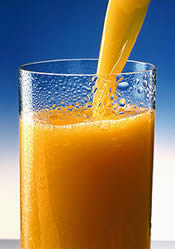
Orange Juice - Could It Kill You?
“That orange juice will kill you,” said a French waitress to my husband’s boss years ago, when the boss was in Paris on business, eating his normal breakfast at the hotel. Later, the boss related the incident, and we all thought that was really funny. How could orange juice kill people? (The French have a lower incidence of heart disease. Is there a connection?)
Well, the joke was really on us. I related this incident about a week ago to a visitor as we talked about nutrition and she mentioned drinking orange juice and eating oranges, thinking she was eating healthily. Yes, I used to think this way too, until I realized how much sugar and carbohydrates were in one orange 2- 7/8″ in diameter. According to NutritionData.com, there are 18 grams of carbs, 3 grams of fiber, and 12 grams of sugar in that orange. If you ate it, you just consumed about 2 1/2 teaspoons of sugar. OUCH! The American Heart Association is suggesting no more than 6 teaspoons of sugar per day for women and 9 for men, although I now think these values are way too high, as these numbers will probably promote insulin resistance.
But what about that orange juice?
Check out the comparison chart at Hooked on Juice of several juices to Coca-Cola. Twelve ounces of orange juice contains a whopping 33 grams of sugar, close to Coca-Cola’s 40 grams, which equates to 8 teaspoons and 10 teaspoons of sugar, respectively. You don’t even get the benefit of the fiber, even if you get orange juice with pulp because it’s negligible, and many of the nutrients in the juices will have been lost while processing the fruit. DOUBLE OUCH! Just think, drinking that orange juice gives you just about the same amount of sugar as a Coca-Cola. You might as well just eat the table sugar. Even worse, check out the other juices on the page: apple juice – 10 teaspoons of sugar, cherry juice – 9 teaspoons of sugar, and grape juice – a whopping 15 teaspoons of sugar! You’ve already reached or exceeded your suggested American Heart Association’s sugar limit for the day.
What’s all that sugar doing inside your body? Spiking your blood sugar and insulin. With insulin now dominant in your body, this master hormone is now telling your body to store most of the food and beverage you’ve eaten as fat. Not only that, insulin is needed to make cholesterol. The more insulin you have in your blood stream, the higher your bad cholesterol and triglycerides will be, which puts one at risk for heart disease.
Diabetes, too, is a real possibility if you have a predisposition for it. At 70 pounds (31.7 kg) of sugar a year, people become diabetic. Seventy may sound like a lot until one realizes that’s over a 365-day period. That calculates to 87 grams (3 ounces) of sugar per day or a little more than 2 1/2 of these 12-ounce servings. Unfortunately, our processed foods are loaded with sugars, so chances are that you might have gone over that 70 mark while consuming one.
 Even if you drink that orange juice regularly and don’t go over the 70 pounds of sugar in a year, chances are you are insulin resistant and at risk for all types of Western diseases, which I’ve mentioned in many of my articles. According to The Protein Power Lifeplan by Michael Eades, M.D., and Mary Dan Eades, M.D., 75 percent of North Americans are insulin resistant.
Even if you drink that orange juice regularly and don’t go over the 70 pounds of sugar in a year, chances are you are insulin resistant and at risk for all types of Western diseases, which I’ve mentioned in many of my articles. According to The Protein Power Lifeplan by Michael Eades, M.D., and Mary Dan Eades, M.D., 75 percent of North Americans are insulin resistant.
Therefore, that comment by the French waitress now rings true. Since managing your weight and health means managing your insulin levels, that orange juice could possibly kill you if you made a habit of drinking it, which my husband’s boss was doing. Water anyone?